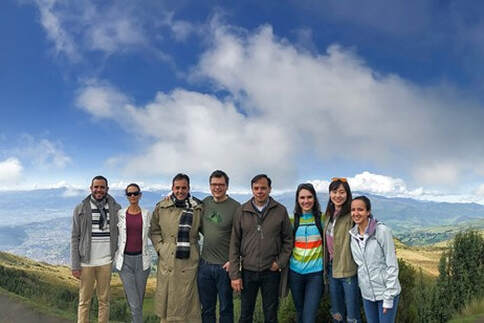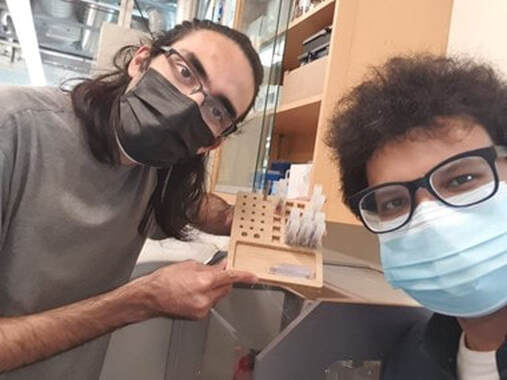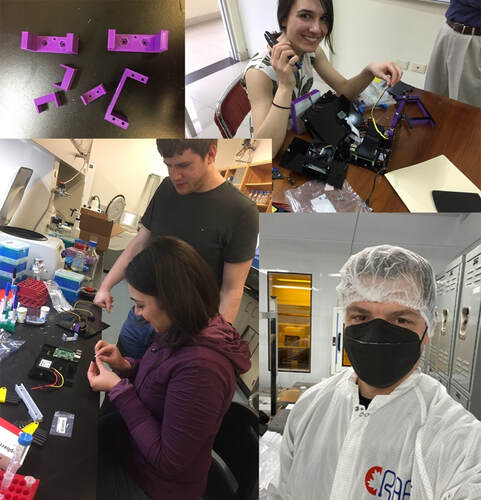Current Projects
 Hiking the Pichincha Volcano above Quito with collaborators from Brazil, Colombia and Ecuador.
Hiking the Pichincha Volcano above Quito with collaborators from Brazil, Colombia and Ecuador.
Background
Genomics research has led to an incredible database of sequence information and a growing suite of molecular tools to manipulate and probe genetic material. These advances have set the stage for what many think will be the century of biology. While exciting, these new diagnostics and therapies are often costly and can place financial burden on even well-resourced health care systems. On a global scale, with almost half of the world living on less than $5.50/day, most people cannot expect to benefit from many of these technologies. Research in our lab is dedicated to extending the reach of today’s advanced health care and is pioneered technologies to tackle the challenge of health care accessibility.
Our research efforts are primarily focused in the area of cell-free synthetic biology, which is a rapidly emerging subdomain of synthetic biology that we are helping to pioneer. We are also beginning to develop companion hardware for enabling our molecular tools and technologies related to cell therapy.
Accessible Health Care Tools
As COVID-19 has demonstrated, there is a tremendous need to extend the standard of care from well-resourced clinics to testing sites in the community, as well as remote or low-resource settings. With this motivation in mind, we are focused on creating low-cost and distributed diagnostics for human health. These efforts have led us to a series of collaborations with domestic and international teams, which have led engaging and productive partnerships. With the support of the International Development Research Centre and Canadian Institutes of Health Research, these efforts have led to projects on Zika, chikungunya and Sars-CoV-2 diagnostics in Brazil, Colombia, Ecuador, Chile and India.
Genomics research has led to an incredible database of sequence information and a growing suite of molecular tools to manipulate and probe genetic material. These advances have set the stage for what many think will be the century of biology. While exciting, these new diagnostics and therapies are often costly and can place financial burden on even well-resourced health care systems. On a global scale, with almost half of the world living on less than $5.50/day, most people cannot expect to benefit from many of these technologies. Research in our lab is dedicated to extending the reach of today’s advanced health care and is pioneered technologies to tackle the challenge of health care accessibility.
Our research efforts are primarily focused in the area of cell-free synthetic biology, which is a rapidly emerging subdomain of synthetic biology that we are helping to pioneer. We are also beginning to develop companion hardware for enabling our molecular tools and technologies related to cell therapy.
Accessible Health Care Tools
As COVID-19 has demonstrated, there is a tremendous need to extend the standard of care from well-resourced clinics to testing sites in the community, as well as remote or low-resource settings. With this motivation in mind, we are focused on creating low-cost and distributed diagnostics for human health. These efforts have led us to a series of collaborations with domestic and international teams, which have led engaging and productive partnerships. With the support of the International Development Research Centre and Canadian Institutes of Health Research, these efforts have led to projects on Zika, chikungunya and Sars-CoV-2 diagnostics in Brazil, Colombia, Ecuador, Chile and India.
 Pouriya and Fahim working in the lab to set-up our CNC milling machine
Pouriya and Fahim working in the lab to set-up our CNC milling machine
Distributed drug manufacturing
Other efforts from the lab focus on improving access to fundamental therapeutics, like vaccines, and other potent protein-based drugs. These therapeutics often require distribution with uninterrupted refrigeration and can be costly. Our group, along with collaborators, are working to address this challenge by harnessing our freeze-dried cell-free system, which can be distributed at room temperature, to create an on-demand platform for manufacturing drugs. Proof-of-concept work has demonstrated the manufacture of 100s molecules, validating the bioactivity of many of products in wide-ranging assays, including animal studies.
Regenerative Medicine
The emerging field of regenerative medicine holds the promise of providing radically new approaches for the treatment of disease. As a member of the University’s regenerative medicine program, Medicine by Design, our lab is dedicated to the development of new technologies in this space and we are doing so with an emphasis on addressing affordability. This includes engineering cell-based solutions and the application of our cell-free technologies to ensure that the envisioned benefits of regenerative medicine are within economic reach for more patients.
Other efforts from the lab focus on improving access to fundamental therapeutics, like vaccines, and other potent protein-based drugs. These therapeutics often require distribution with uninterrupted refrigeration and can be costly. Our group, along with collaborators, are working to address this challenge by harnessing our freeze-dried cell-free system, which can be distributed at room temperature, to create an on-demand platform for manufacturing drugs. Proof-of-concept work has demonstrated the manufacture of 100s molecules, validating the bioactivity of many of products in wide-ranging assays, including animal studies.
Regenerative Medicine
The emerging field of regenerative medicine holds the promise of providing radically new approaches for the treatment of disease. As a member of the University’s regenerative medicine program, Medicine by Design, our lab is dedicated to the development of new technologies in this space and we are doing so with an emphasis on addressing affordability. This includes engineering cell-based solutions and the application of our cell-free technologies to ensure that the envisioned benefits of regenerative medicine are within economic reach for more patients.
 Seray, Peivand and Evan working on our portable, low-cost PLUM reader; and a recent trip to the new CRAFT-NRC Device Foundry at the University of Toronto.
Seray, Peivand and Evan working on our portable, low-cost PLUM reader; and a recent trip to the new CRAFT-NRC Device Foundry at the University of Toronto.
Hardware and Material Interfaces
With a focus on the application of molecular biology to meet real world challenges, the field of synthetic biology is, by its nature, highly interdisciplinary. Work in the area of cell-free synthetic biology is especially well-positioned to exploit the interface between the domains of biology, chemistry and engineering. Without a cell wall, our synthetic molecular reactions can be easily manipulated and interact with purpose-built companion devices.
With a focus on the application of molecular biology to meet real world challenges, the field of synthetic biology is, by its nature, highly interdisciplinary. Work in the area of cell-free synthetic biology is especially well-positioned to exploit the interface between the domains of biology, chemistry and engineering. Without a cell wall, our synthetic molecular reactions can be easily manipulated and interact with purpose-built companion devices.
Our lab builds off the work performed by Dr. Pardee during his postdoctoral fellowship at The Wyss Institute in Boston, on the paper-based synthetic biology platform.
